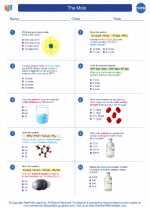Materials in Chemistry
Materials are substances used to make objects, structures, and products. In the field of chemistry, materials are studied for their properties, composition, and behavior under different conditions. Understanding materials is important for developing new products, improving existing ones, and solving real-world problems.
Types of Materials
Materials can be classified into several categories based on their composition and properties:
- Metals: Elements or compounds that have metallic properties, such as conductivity, malleability, and luster.
- Polymers: Large molecules made up of repeating units called monomers. Examples include plastics, rubber, and fibers.
- Ceramics: Inorganic compounds, often made of clay and other minerals, that are heat-resistant and often used in pottery, tiles, and electronics.
- Composites: Materials made by combining two or more different types of materials to create a new material with enhanced properties.
- Biological materials: Substances derived from living organisms, such as wood, silk, and bone.
Properties of Materials
The properties of materials can be divided into two main categories: physical properties and chemical properties.
- Physical properties: These are characteristics that can be observed or measured without changing the composition of the material. Examples include density, color, conductivity, and melting point.
- Chemical properties: These are characteristics that describe how a material behaves in the presence of other substances. Examples include reactivity, flammability, and corrosion resistance.
Studying Materials
When studying materials, it's important to consider the following aspects:
- Composition: What elements or compounds make up the material?
- Structure: How are the atoms or molecules arranged in the material?
- Properties: What are the physical and chemical properties of the material?
- Uses: How is the material used in industry, technology, or everyday life?
Applications of Materials
Materials play a crucial role in various applications, including:
- Engineering: Building materials, structural materials, and materials for electrical and mechanical components.
- Medicine: Biomaterials for implants, drug delivery systems, and medical devices.
- Energy: Materials for batteries, solar cells, and energy storage systems.
- Environmental protection: Materials for pollution control, waste treatment, and sustainable technologies.
Study Guide
To study materials effectively, consider the following steps:
- Learn the classification of materials and examples of each type.
- Understand the physical and chemical properties of materials and how they are tested and measured.
- Explore the atomic and molecular structure of different materials.
- Research real-world applications of materials in various industries and technologies.
- Practice identifying materials based on their properties and uses.
By mastering the topic of materials in chemistry, you'll gain a deeper understanding of the world around you and the role of materials in shaping our modern society.
.


